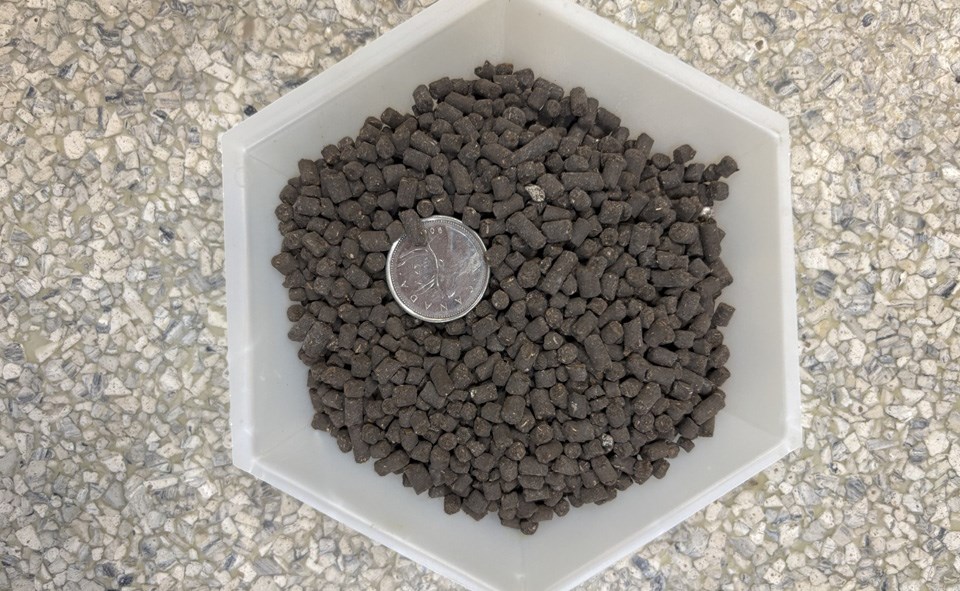I am often asked, “How do I know if I have good soil?” or “What can I add to my soil to make it better?” There are many soil amendments available. Some amendments can be helpful, some can be costly, and some can even be detrimental. Before you spend a lot of time and money on amending your soil with a product, educate yourself on what that product is used for and whether or not it will be useful in your garden. Following is a list of common soil amendments that might be recommended, or not.
Compost is decomposed organic matter (ex., grass, leaves, food waste, paper and helpful living organisms like soil bacteria and fungus). Compost is always a beneficial addition to your soil. Compost not only adds nutrients to your soil that plants require, but it also adds organic matter and provides an excellent medium for microorganisms to thrive. Adding 5-10cm of compost each year to your garden and pots is recommended and will make other soil amendments unnecessary.
Synthetic fertilizers are added to soil to provide nutrients for plants. Synthetic fertilizers are derived from mineral deposits or atmospheric nitrogen and are manufactured into products containing the elements that plants need. Each synthetic fertilizer product is different and provides different levels of nutrients to plants. Using synthetic fertilizers in your garden can be beneficial; however, over fertilizing can damage plant roots, increase salt in the soil and pollute groundwater. Synthetic fertilizers do not add organic matter or provide increased habitat for soil microorganisms. Apply synthetic fertilizers only if necessary and according to label directions.
Unlike synthetic fertilizers, organic fertilizers add organic matter as well as nutrients to your soil. Organic fertilizers are derived directly from plant or animal sources (ex., bone meal, alfalfa pellets, compost or manures) or from rock minerals that are finely ground (ex., limestone and rock sulphate). Organic fertilizers, like well-rotted manure from your farmer friend, are much more cost-efficient than the organic fertilizer you purchase in the fancy pink bag.
Gardeners are often concerned about the pH of their soil. Most Saskatchewan soils have a pH somewhere between 6.1 and 7.5. This pH range is recommended for most vegetables and flowers. Prairie soils are very resistant to changes in pH because of the presence of free lime in the soil as well as their soil buffering capacity. Adding Sulphur (to lower pH) or lime (to increase pH) is a waste of time and money in Saskatchewan soils. Using synthetic fertilizers such as aluminum sulphate and ammonium sulphate to lower soil pH is also not recommended.
Peat moss is often recommended to add to the soil to increase moisture moisture-holding capacity of the soil or to decrease the pH. While peat moss will add organic matter to your garden, the soil pH will not change. A more environmentally friendly and cost-efficient method for adding organic matter to your garden is adding compost or well-rotted manure.
Wood ashes contain calcium, potassium and some phosphorous. Wood ashes can be high in salts, which can increase the alkalinity of the soil over time. Use wood ashes sparingly in your garden soil.
Biochar is a charcoal-like substance that is a stable form of carbon. Carbon is a necessary element in many plant growth processes. Biochar is made by burning organic material from agricultural and forestry wastes (ie, biomass) in a controlled process called pyrolysis. Biochar is helpful when added to soil according to label directions.
Probiotic soil conditioners are supplements containing beneficial bacteria, fungi and mycorrhizae. There are many probiotic soil conditioners on the market these days. Some of these conditioners are more beneficial than others. The advantages and cost effectiveness of individual products vary greatly.
Many times over the years, I have heard ‘experts’ recommend adding gypsum (calcium sulphate) to increase the porosity in heavily compacted soils. This is not recommended. The benefits of gypsum to decrease soil compaction are temporary. If your soil is compacted, your soil needs more organic matter: compost!
And in conclusion: add compost, compost and more compost!!!
This column is provided courtesy of the Saskatchewan Perennial Society (SPS; [email protected]). Check our website () or Facebook page () for a list of upcoming gardening events.




